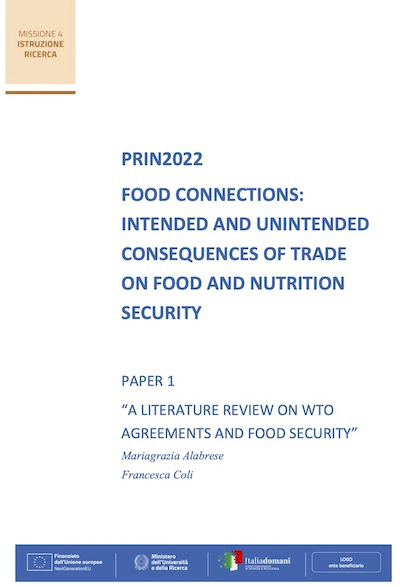

 Image credit: Unsplash
Image credit: Unsplash
There is general agreement among scholars that there is a direct and tense relationship between food security and free trade policies (Fakhri, 2020; Matthews, 2014b; Hughes and Baker, 2015; Orford, 2015; Kaufmann and Heri, 2007). Indeed, trade liberalization measures can enhance or undermine food security (Häberli, 2010; Matthews, 2014b). Examples of measures with potential negative impacts on food security include tariff cuts (e.g. reduction of tariff barriers in developing countries may make imported food cheaper than domestic production), domestic subsidies (e.g. reduction of domestic subsidies may affect food security by limiting the tools available to developing countries to promote food production), import barriers (e.g. reduction of import barriers may not benefit all developing countries equally) and export subsidies (e.g. countries that rely on imports for domestic food supply may experience price increases and greater food insecurity) (Gonzalez, 2002). At the same time, the international trade regime is also seen as a catalyst for achieving food security (Stewart and Manaker, 2015), as it plays an important role in ensuring access to food in the longer term by moving food from where it is available to where it is needed (Kerr, 2011), and in stabilizing prices on the internal market, regardless of whether the food consumed is domestically produced (Soares Peres and De Souza Daibert, 2017). This debate clearly revolves around the role of the World Trade Organization (WTO) regime, whose main objective has always been the liberalization of international trade. The question, therefore, is whether the WTO agreements are in support of food security or whether they undermine it (Margulis, 2020; Häberli, 2010; Kaufmann and Heri, 2007). This is certainly not a new discussion, as disagreements over food security, including between states, are a recurring phenomenon in the multilateral trading system of the WTO (and the General Agreement on Tariffs and Trade (GATT)) (Margulis, 2017). Olivier de Schutter, former Special Rapporteur of the UN Human Rights Council on the right to food, has been one of the main critics of the use of trade in pursuit of food security, arguing that the WTO agreements are incompatible with the measures that developing countries need to take to promote their food security (De Schutter, 2011, 2009). In a different vein, Michael Fakhri, the current Special Rapporteur of the UN Human Rights Council on the right to food, argues that the modern international trade regime is not, and should not be, defined by “one single overarching value the idea of trade liberalization or freer trade—but by an interaction among three closely related but analytically distinct doctrines’:’ market stabilization, freer trade, and food security” (Fakhri, 2020).Based on these premises, the following sections focus on the main WTO agreements that have been identified in the legal literature as relevant to food security issues (section II) and on the specific norms of such agreements that have been deemed to relate to food security (section III). This study aims to provide a general overview of what scholars have focused on when addressing the tension between WTO trade liberalization rules and food security.